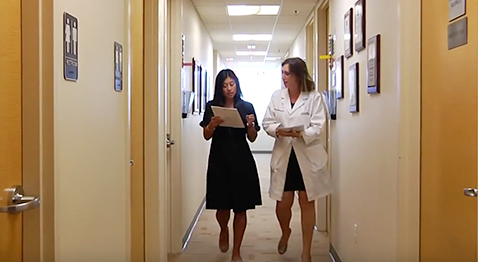When to See a Reproductive Endocrinologist
People are often surprised at the amount of time it can take to get pregnant once the decision to start a family has been made. For normal healthy couples, it is not uncommon for several months to go by before pregnancy is achieved. Many begin to wonder whether there might be something wrong, adding worry to the stress of waiting. At IVF FLORIDA Reproductive Associates, we want patients to be informed about their fertility and to know the difference between when to consider medical assistance and when to try to relax and let nature take its course. Contact our offices in the Miami - Fort Lauderdale, Florida region for infertility treatment if you fit any of the descriptions below or as shown in this infographic.

You have been trying to conceive for a full year without success
In most cases, couples should try to conceive naturally for one full year before seeking infertility treatment. For perfectly healthy, normal couples, there is only a 48-hour window of fertility during each month and approximately a 20 percent chance of conception and implantation in any given cycle. Therefore, it may take many months for couples with absolutely no fertility problems to become pregnant.
You have a history of miscarriage or infertility
If one or both partners have undergone infertility treatment in the past, there is a high likelihood that the same problem will once again interfere with conception. Depending on the cause of infertility, it may be necessary to seek treatment immediately or after three to six months of trying to conceive naturally. Consult your physician or contact our Florida fertility specialists to get a recommendation based on your individual condition. If you are a woman who has experienced two or more miscarriages or who has a family history of recurrent pregnancy loss, it is recommended that you consult your OB-GYN before attempting to become pregnant. Infertility treatment may or may not be necessary, depending on your condition, but you will certainly need close monitoring during your pregnancy.
Your menstrual cycles are irregular or have ceased
Women whose menstrual periods do not occur at regular intervals may have trouble getting pregnant for a number of reasons. Among these is the difficulty of pinpointing ovulation when there is no consistency in the length of cycles. It is also possible that a hormonal imbalance is affecting ovulation or that a related medical condition is interfering with conception and implantation. Women with irregular periods should seek infertility treatment after six months of trying to conceive naturally, or sooner if recommended by a physician.
The complete cessation of the menstrual cycle in younger women can occur as a result of certain medical conditions, such as anorexia nervosa or polycystic ovarian syndrome, or early menopause, also known as premature ovarian failure. Whatever the cause, complete absence of menstruation is a strong indication of infertility and women who do not menstruate should seek medical assistance as soon as they decide to try to become pregnant.
You are a woman over the age of 35
Unfortunately, a woman's fertility tends to decline sharply after the age of 35. Due to decreased quality and quantity of eggs, hormonal shifts, and other factors, a woman in her late thirties is likely to have a much harder time conceiving and carrying a pregnancy to term than a woman in her late twenties. Therefore, it is best not to wait the full year recommended for most couples before getting a fertility assessment. However, as long as the woman is healthy and has no other factors for infertility, she should try to conceive naturally for six months before seeking infertility treatment.
You or your partner have or have had a reproductive condition
Women who have been diagnosed with endometriosis, PCOS, PID, or any type of pelvic infection or tubal disease are most likely already aware of the effects of their condition on fertility. Depending on the seriousness of the problem, women may be advised to undergo infertility treatment as soon as they decide to become pregnant or after as long as six months of trying to conceive without success. Consult your regular doctor or contact our practice if you have any such condition and are unsure about when to seek infertility treatment.
Likewise, men who have or have had any condition relating to the testicles, prostate, or other reproductive organs, or any type of hormonal imbalance, should consider infertility treatment after six months of trying to conceive naturally.
You or your partner have or have had a sexually transmitted disease
If one or both partners currently have a sexually transmitted disease (STD), it is important to seek medical assistance before trying to become pregnant. Not only can many different STDs cause temporary or permanent infertility, but an active disease can also threaten the health of the child, should pregnancy occur. If the STD is curable, it should be treated and completely resolved before attempting to conceive. In the case of a lifelong disease, special care must be taken throughout the conception process and pregnancy in order to protect the health of everyone involved.
Certain types of STDs can cause permanent damage that will remain even after a person is cured of the disease. If one or both partners have undergone treatment for an STD in the past and the couple has been trying to conceive for six months without success, it is best to seek infertility treatment.







